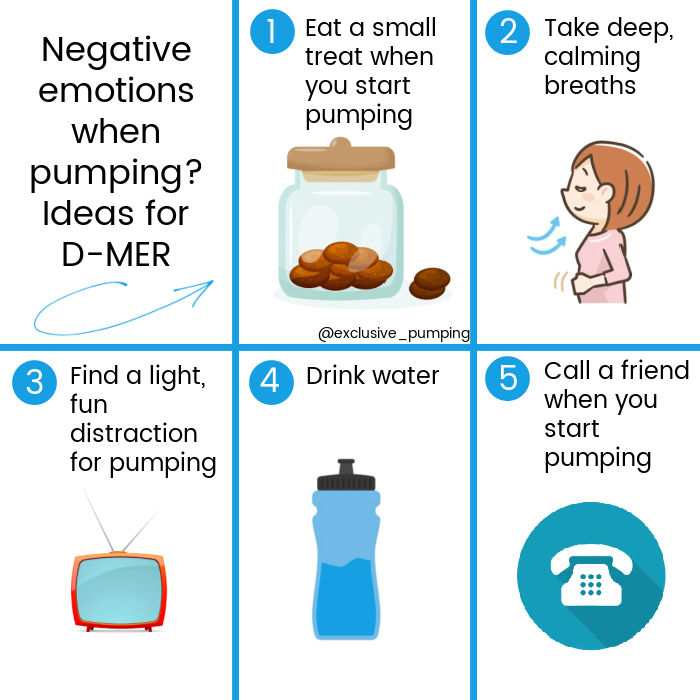Do you feel negative emotions like anxiety or depression at the start of your pumping or nursing sessions? This is called D-MER, or Dysphoric Milk Ejection Reflex. Here are some options for how to manage or treat D-MER at home.

This post may contain affiliate links, which means if you click a link and purchase something, I may make a small commission at no additional cost to you. I only recommend products I love! More information here.
What is D-MER?
D-MER (Dysphoric Milk Ejection Reflex) is a wave of negative emotions that occurs while pumping or nursing, usually when milk lets down. It usually begins right before a letdown and lasts 30-90 seconds.
Women with D-MER report feeling sadness, anger, anxiety, irritability, dread, nervousness, and/or agitation when their milk lets down.
What causes it?
The thinking is that D-MER is caused by a sudden drop in dopamine right before a letdown. We don’t know why some women experience this, and others don’t.
Even though D-MER results in negative emotions, it is not a psychological problem. It is a physiological issue:
But in a mother with D-MER, when dopamine lowers, it falls too wide or too low or too fast in the central nervous system. When dopamine drops inappropriately in a mother with D-MER, the dopamine receptors that are present in the pleasure center of the brain are deprived of the dopamine they need which results in the wave of negative emotions. (Heise)
Are there any D-MER treatments?
If you have severe D-MER, you may want to consider talking to your doctor about potential medications. Medications that increase dopamine levels may help.
For women with mild or moderate D-MER, it’s recommended that you track your symptoms along with anything that might be affecting it (lack of sleep, dehydration, stress, etc.). This will allow you to figure out what makes it worse, as well as what you might be able to do to lessen your symptoms.

I asked on instagram what helped moms manage D-MER. Below are the top D-MER home remedies that were mentioned.
1. Deep, calming breaths
Many women said that starting deep breaths at the beginning of their sessions until the negative feeling associated to D-MER went away a few minutes into their session helped them get through it.
2. Eating a treat when you start to pump
Eating something small (like a chocolate) helped some women distract themselves during the negative feelings.
(Also, knowing you’re going to get a treat of some kind can help motivate you to pump/counteract the dread of pumping that can go along with D-MER.)
3. Light, enjoyable distractions when you start pumping (watching a funny show, reading a book, that kind of thing)
If eating something you enjoy doesn’t work for you, having something that’s not food-related to look forward to can have the same benefit!
Anything that cheers you up or makes you happy can work well – a light Netflix show you enjoy, a book that distracts you, fun music, etc.)
4. Drinking water while pumping
A lot of women mentioned that staying hydrated and focusing on drinking water helped them manage their D-MER symptoms.
5. Call a friend while you pump
Several women mentioned that calling someone/interacting with someone while they pumped helped them get through the negative emotions associated with D-MER more easily.
Need help with exclusive pumping? Use EPUMP30 for 30% off
6. Weaning from breastfeeding
If nothing works and you are miserable, weaning is an option. Your mental health and the way you feel are important, too.
The only thing I would caution you is just to be certain that you are ready to wean. If you’re not sure, maybe try dropping a pumping session and see how you feel. If it’s more manageable, you can stick with that for awhile. If it’s not, you can keep weaning.
(More on weaning from the pump here.)
Please feel free to share your experience and whether any D-MER treatments have helped you in the comments!
References
- Heise, Alia Macrina, CLC. “Helping Professionals Understand Dysphoric Milk Ejection Reflex (D-MER)” https://img1.wsimg.com/blobby/go/07432874-d089-423f-97a6-b7fa6a74c046/downloads/1boirob67_102745.pdf?ver=1596636212042
- Heise, Alia Macrina, CLC. “Helping Mothers Understand Dysphoric Milk Ejection Reflex (D-MER)” https://img1.wsimg.com/blobby/go/07432874-d089-423f-97a6-b7fa6a74c046/downloads/1boirob65_701086.pdf?ver=1596636212041















